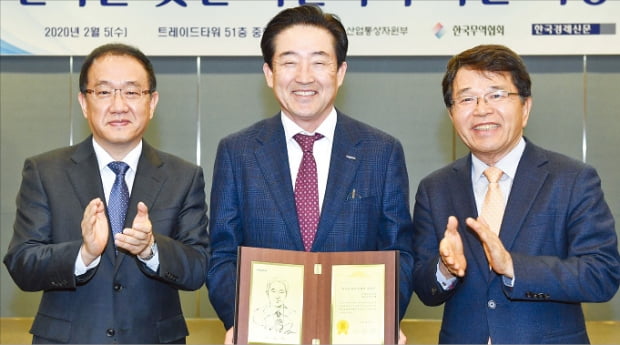
- This is PANASIA
- ESG Management
- History
- Smart PANASIA
- Contact information
 About
About
Check PANASIA introduction,
ESG management, and History
information
- Energy Solutions
- Air Solutions
- Water Solutions
 Eco-friendly Solution
Eco-friendly Solution
About Global environmental
regulation, Hydrogen business,
Air quality, and Water quality
environment solutions
- Product Service
- Service Network
- Customer Service
 Customer Support
Customer Support
Check the Panasia’s
after service
- About
- Eco-friendly Solution
- Customer Support
- Media
NEWS
Title
Soo-tae Lee, CEO of PANASIA, honored with “125th Korea’s Trader of the Month Award”
Date
2020-02-05
Hit
1816
File
Soo-tae Lee, CEO of PANASIA, honored with “125th Korea’s Trader of the Month Award”

Soo-tae Lee, CEO of PANASIA (middle), was chosen by the Korea International Trade Association (KITA) as the recipient of the 125th Korea’s Trader of the Month Award.
(From left, Senior Vice President of Hanbit Association Bae Soo-cheon, CEO Lee, and Vice Chairman of KITA Han Jin-hyeon. Photo courtesy of KITA)
Desulfurization scrubber systems remove sulfur in ship exhaust gas emissions. They are installed to prevent air pollution by reducing sulfur content in ship fuels.
As the International Maritime Organization (IMO) imposed a sulfur cap of 0.5% or less on ship fuels this year, the number of ships using scrubber systems has skyrocketed.
PANASIA, Busan-based eco-friendly energy system expert, has no rivals in this area. Early on, the company began R&D in response to the global move towards tighter environmental regulations and successfully commercialized its scrubber systems before the IMO imposed the new limit. The 1999 winner of the 1-million-dollar export tower for its level control and measurement system, PANASIA developed its de-SOx scrubber system and received the 100-million-dollar export tower award last December.
Evolving into a global eco-friendly expert with locally-developed technology
In 1989, PANASIA started off as Beom-A Precision Engineering, a level control and measurement system manufacturer. Founder and CEO Soo-tae Lee is an engineer who worked at one of the biggest Korean shipbuilders.
He decided that the Korean shipbuilding industry should become more independent and started his own busiess with the goal of localizing marine equipment.
The company’s slogan “Pursue the challenge of new creation” reflects his commitment to creating distribution channels globally through technological innovation.
In December 2019, PANASIA received government approval for its ballast water management system and successfully commercialized it.
This system stores seawater on board to provide adequate stability to the ship. The system is installed to prevent pumped-in seawater from disrupting the ecological balance.
It was around this time that PANASIA made its name known around the world as an environmentally friendly system expert.
In the year after the success of its ballast water management system, PANASIA saw its revenue grow more than 10 times. This success was a result of the company’s aggressive global market expansion; in 2011, the company established a Chinese corporation, followed by its Japanese corporation in 2012, and its European corporation in 2016. In 2016, PANASIA was selected for the government’s World Class 300 project. Through this R&D project, the company commercialized a de-SOx scrubber system, its flagship product in 2018. This new product provided a significant boost to the company’s revenue, from 64.7 billion won in 2018 to 328.6 billion last year.
“4 First” Business Strategy Modeled after Sun Tzu’s The Art of War
PANASIA’s flagship products, de-SOx scrubber and ballast water management system, have a global market share of 14% (1st place) and 16% (2nd place), respectively.
Over 80% of PANASIA’s revenue comes from exports. CEO Lee credited the “4 First” business strategy modeled after Sun Tzu’s The Art of War for PANASIA’s success in international markets. In other words, “See First,” “Do First,” “Strike First,” and “Occupy First.”
Lee said, “It was this business philosophy that helped us predict changes in the IMO’s environmental policy and develop the de-SOx scrubber system to keep up with increasing numbers of eco-friendly systems.”
PANASIA owns 272 types of intellectual property (IP) rights, including patents and utility models, for the proprietary technologies it developed locally and overseas.
In 2006, PANASIA established an affiliated R&D center to continue its R&D efforts by working with 30 research professionals. The company plans on strengthening its smart technology by combining manufacturing with information and communications technology (ICT).
The company will focus on remote diagnostics services using its satellite control system, while improving price competitiveness and product quality through smart factory expansion.
PANASIA aims to solidify its position as a global market leader and continue to develop new growth engines. CEO Lee said, “Our credo is ‘Don’t compete, but dominate.’ We will find areas where we can dominate using local technologies and ceaselessly work hard.”
min@hankyung.com










